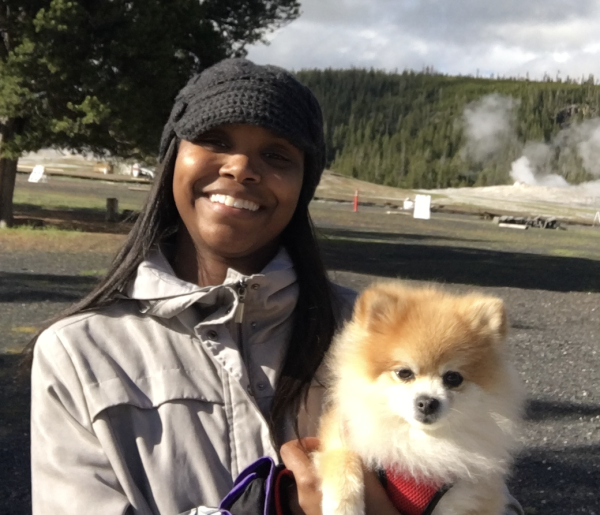-
About
- Leadership & Faculty
- News & Events
-
Academics
- Graduate
- Advanced Clinical Training
- Continuing Education
-
Student Life
-
Research
-
Hospitals & Clinics
- Emergency Care
- Hospital Services
-
Community Outreach
- Volunteer
Searching for Answers
Katelin Jackson, VG15, developing her career in the study of infectious diseases

An unexpected phone call from Tufts changed the course of the career of Katelin Jackson, VG15.
From childhood, Jackson had a strong interest in the sciences and planned to become a veterinarian. She had pet bunnies and dogs growing up in her Brooklyn, New York, home, and she and her father liked to raid her mother’s spice rack for “chemistry experiments.”
Jackson earned a bachelor’s degree in animal sciences at Cornell University. She appreciated the hands-on experience, working directly with barn animals, and also developed an interest in wildlife. After graduating from Cornell in 2012, Jackson served as an assistant research technician at New York University Langone Medical Center, researching pulmonary hypertension. But she missed fieldwork and applied to the veterinary program at Cummings School of Veterinary Medicine at Tufts University.
Tufts reached out with a phone call to gauge her interest in the Master of Science in Conservation Medicine (MCM) program at Cummings School.
“My goal was still vet school at the time, but this was an opportunity to experience something else and see where that goes,” said Jackson. “If I didn’t do this program, I probably wouldn’t be where I am today.”
Once she started the MCM program, Jackson’s career focus shifted. She found it fascinating to learn how diseases spread between humans and animals in the “Health, Disease, and the Environment” course, especially during a guest lecture presented by Dr. Jonathan Epstein, V02, MG02, a veterinarian and disease ecologist involved in public health work.
“Public health was new to me. That was the door I didn’t know needed to be opened—seeing the connectivity between diseases and the environment,” said Jackson.
She took advantage of opportunities to research infectious diseases and wildlife. For her case study project, Jackson analyzed 14 states’ management of sheep in preventing the spread of pneumonia from domestic sheep to bighorn sheep. During her externship at the Prairie Dog Coalition in Colorado, Jackson spent a week in Thunder Basin National Grassland in Wyoming, evaluating the effects of dusting to kill fleas that carry bubonic plague and other infectious diseases to prairie dogs. Coming from Brooklyn, she enjoyed the fieldwork, particularly one night when a herd of cattle huddled alongside the researchers in their tents during a storm.
After wrapping up the MCM program, Jackson went on to earn her Master of Public Health, specializing in Zoonotic/Infectious Disease, at Colorado School of Public Health. In 2017, she accepted a position as an entomologist at the Centers for Disease Control and Prevention (CDC) in Fort Collins, Colorado, where she tested mosquitos for viruses and published her first authored paper on her tick work, “Bourbon Virus in Wild and Domestic Animals in Missouri, USA.” She liked the mix of work in the field, lab, and office.
Jackson is currently pursuing a Ph.D. in Immunology and Infectious Disease at Washington State University. When she rotated into the lab of epidemiologist, Dr. Eric Lofgren, she found her fit. Dr. Lofgren hired her as a graduate research assistant, where she uses computational epidemiology and mathematical modeling to study infectious diseases. One of her main projects focuses on understanding why emerging infectious diseases accelerate once they reach the hospital.
After she graduates next year, Jackson would like to work for the government or complete a postdoctoral fellowship in an interdisciplinary lab in either disease ecology or infectious diseases, where she can continue her work in infectious disease modeling. She hopes to be accepted into a fellowship program on modeling at the CDC to further hone her skills.
Her Pomeranian, Moca, has been along for the ride with Jackson since the MCM program at Tufts, making the moves with her from Massachusetts to Colorado to Washington.
“I took the long way to get where I am, and it’s great.”
Cummings School offers a variety of graduate programs where you can make a difference. Learn more about our MS in conservation medicine, animals and public policy, or infectious disease and global health.
Department:
MS in Conservation Medicine